Larry Summers was accustomed to having the most powerful people in the world eating out of the palm of his hand.
As Bill Clinton‘s treasury secretary and Barack Obama‘s head of the National Economic Council; as chief economist of the World Bank and president of Harvard, Summers could get an audience with nearly anyone he pleased.
Yet an encounter on Tuesday – revealed in a furtively-filmed video of him apologizing to a classroom of college students – showed him in a rather different light.
‘Some of you will have seen my statement of regret, expressing my shame, with respect to what I did in communication with Mr [Jeffrey] Epstein,’ said Summers, 70, addressing an auditorium at Harvard, where he was teaching.
By the following day Summers, the Harvard president emeritus, had announced he is ceasing teaching and going on leave, as the school investigates his ties to convicted sex offender and pedophile Jeffrey Epstein.
For days Summers has been at the center of a firestorm, after a House Committee released 20,000 emails obtained from Epstein’s estate.
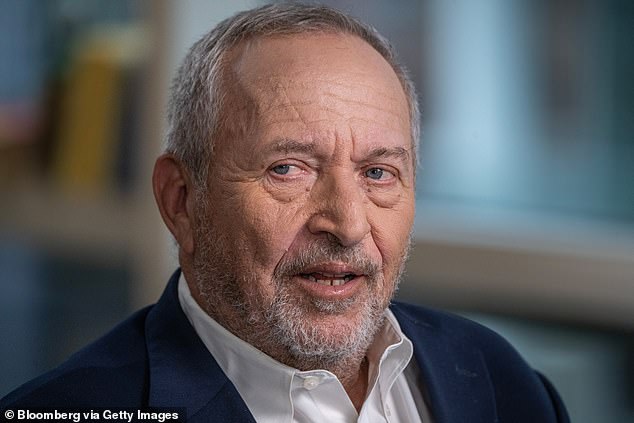
The House Oversight Committee released a vast tranche of Epstein emails last week, including several sent by one of Harvard’s most distinguished professors Larry Summers (pictured)
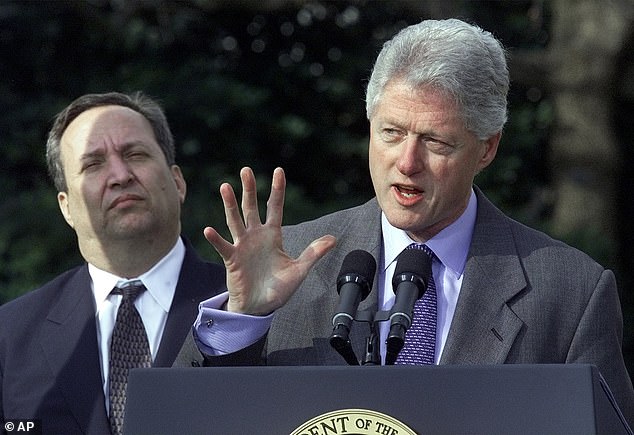
Summers previously served as the Treasury Secretary in the Clinton administration
The correspondence shows how Summers maintained a cozy relationship with Epstein, even after the disgraced financier pleaded guilty to, and served time for, soliciting and procuring a minor for prostitution in Florida in 2008.
In one message, Summers, a married father of six, asked Epstein for advice on ‘getting horizontal’ with a woman whom Summers once described as a mentee, complaining in March 2019: ‘I dint [sic] want to be in a gift giving competition while being the friend without benefits.’
Epstein several months earlier joked that he served as a ‘wing man’ for Summers, whose wife of 20 years, Elisa New, is a professor of American literature at Harvard.
But it’s not only Summers who is now under renewed scrutiny. This unpleasant drama also serves to spotlight a seemingly deep and disconcerting link between Epstein and the university itself.
Harvard, America’s oldest and wealthiest university, began courting the Brooklyn-born financier in 1992, according to the university’s own report commissioned after Epstein’s sex trafficking arrest in 2019 and published in May 2020.
At that time, in the early 1990s, Epstein, a former math teacher at Manhattan’s Dalton school, had worked for around five years as a trader at investment bank Bear Stearns and recently set up his own investment firm.
He had recently met Leslie Wexner, the billionaire founder of a conglomerate that owned Victoria’s Secret and who would become one of Epstein’s most valuable clients. Wexner, now 88, said in September 2019 that he had severed ties with Epstein more than a decade ago, and that the financier had ‘betrayed’ him and ‘misappropriated vast sums of money’ of Wexner’s fortune.
Epstein in the early 1990s had also begun to be seen around town with Ghislaine Maxwell, the charming and impeccably-connected British society heiress.
People were beginning to pay attention.
In 1992, ‘some of the University’s most senior leaders met with Epstein to seek his support,’ reported the three people tasked by Harvard in 2019 with investigating Epstein’s connections to their institution.
In 1998, Epstein would make his first of many donations to the university.
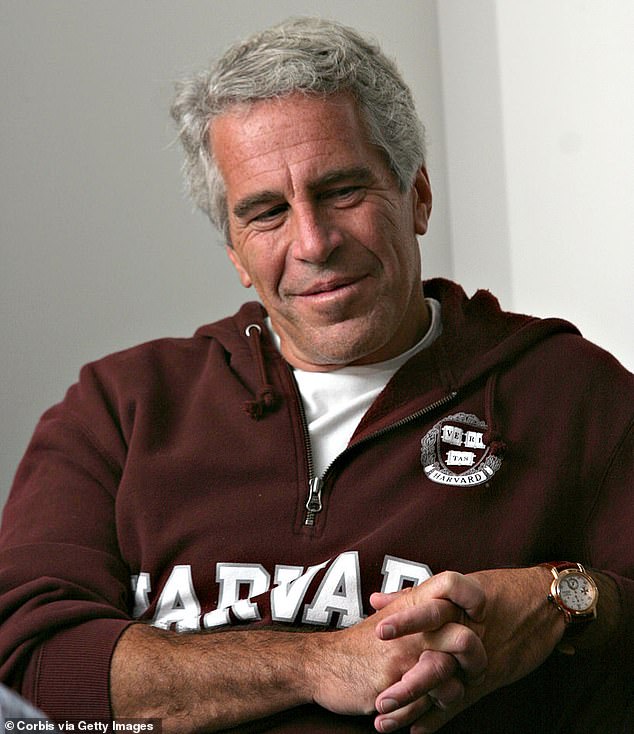
Epstein, a college dropout and former math teacher charged in 2006 with sex offences, visited Harvard’s campus as recently as October 2018. He was arrested for the final time in July 2019
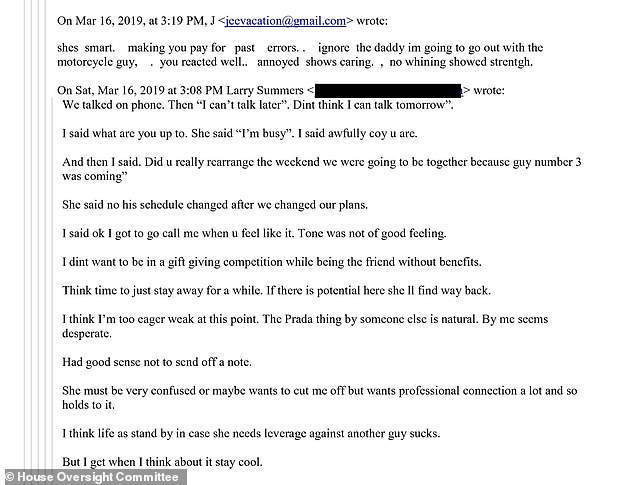
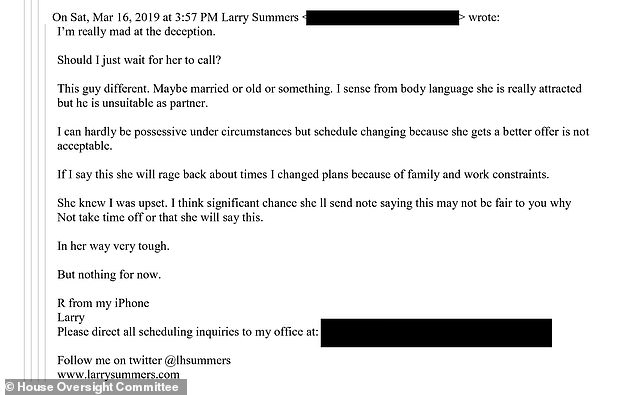
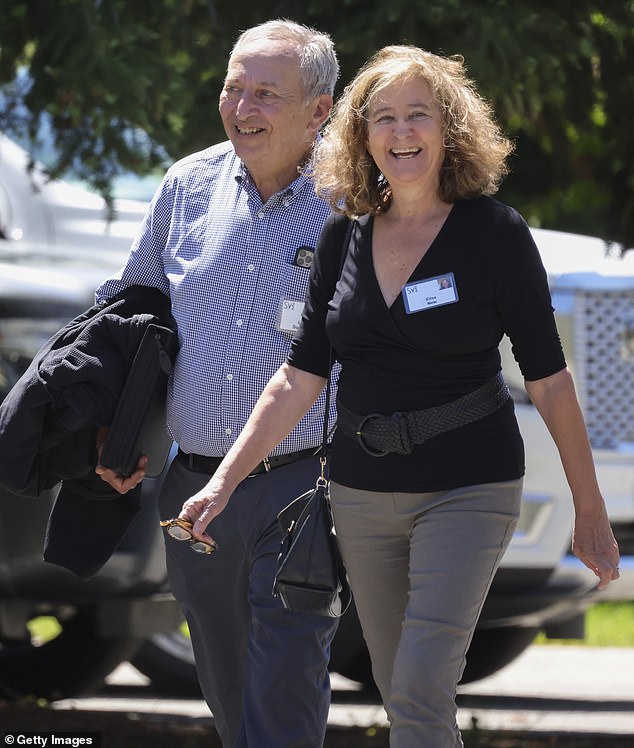
Summers is married to Elisa New, who is a professor emerita of American Literature at Harvard. They are pictured walking together during the Allen & Company Sun Valley Conference in 2022
That same year, Summers – at the time deputy treasury secretary, about to be promoted – would be recorded as flying on Epstein’s Boeing 727 from Aspen, Colorado to Dulles Airport in Washington DC.
The 2020 report found he was not the only Harvard figure to enjoy Epstein’s largesse.
‘A number of the Harvard faculty members we interviewed also acknowledged that they visited Epstein at his homes in New York, Florida, New Mexico or the Virgin Islands, visited him in jail or on work release, or traveled on one of his planes,’ the authors noted.
By September 2005, Epstein had been approved as a visiting fellow at the university’s psychology department, despite not having an undergraduate degree. He was recommended for the prestigious post, which involves research and presentations, by Professor Stephen Kosslyn.
Kosslyn had ‘known Epstein for many years’, the report noted, and the professor had received $200,000 from Epstein between 1998 and 2002 to support his work.
Kosslyn was asked by the university why someone without any of the normal qualifications should be given such an honor, and conceded that Epstein was an unusual choice. But, Kosslyn said, Epstein was ‘extraordinarily intelligent, broadly read, and very curious,’ and he wished every student were as committed.
Epstein showed up to register and then was seen infrequently. But he made an impact.
‘An administrator recalled Epstein’s appearing at registration accompanied by several women who appeared to be in their 20s,’ the report stated.
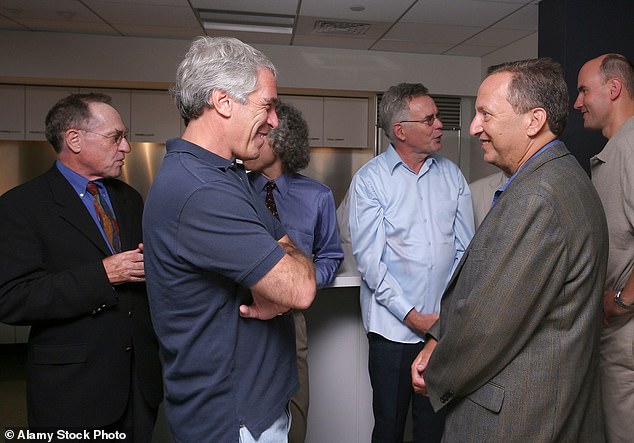
In email exchanges dated between 2013 and 2019, Summers and Epstein shared their thoughts about current events and politics – while also delving into the married economics professor’s love life. Epstein is pictured smiling at Summers in 2004
By July 2006, revelations of Epstein’s indictment for prostitution involving a minor were widely known, but the money continued to flow.
Epstein donated $9 million between 1998 and July 2007 – with all but $200,000 spent. The leftover cash was donated by the university in May 2020, at the time of the report’s publication, to charities assisting victims of sexual abuse.
Then-president Drew Faust had ordered in 2007 that the university turn down donations, deciding that having Epstein on their donor list was not in the university’s best interest.
But even after Epstein was told to stop giving, he kept on trying – often, according to the 2020 report, enlisting professors whose work he bankrolled to plead on his behalf.
Between 2010 and 2014, Professor Martin Nowak – the recipient in 2003 of Epstein’s largest donation, $6.5 million to set up the Program for Evolutionary Dynamics (PED), an institute exploring evolution – ‘sought clarification or reconsideration about whether PED could accept funds from Epstein’.
Tamara Rogers, the then-vice president for alumni affairs and development, held a meeting in November 2013 with the chair of the math department to discuss Epstein’s continued attempts to funnel cash into the university, describing him in an email in the report as ‘a former donor with some reputational issues [who] has approached a couple of departments (individual faculty members) to discuss support.’
The university did not receive further funds from Epstein – but some figures within his circle were still extremely generous, even though there is no evidence that they donated on Epstein’s behalf.
Wexner, financier Leon Black and hedge fund manager Glenn Dubin all endowed fellowships at Harvard’s world-renown Kennedy School of Government.

Summers on Monday said he would be ‘stepping back’ from public life but would continue to teach economics at Harvard; by Wednesday, he said he was stopping his teaching
For Epstein, it was a helpful arrangement that served to whitewash his reputation.
Harvard’s PED institute studied human evolution – something now known to be a passion of Epstein’s, though in a deeply disturbing way.
A New York Times report, published weeks before Epstein’s death, revealed that he wanted to use his New Mexico ranch as a place where he could ‘seed’ women with his DNA, and establish a master race.
His association with Harvard reportedly brought him into contact with some of America’s greatest thinkers – among them the late Murray Gell-Mann, who won the Nobel Prize for physics, and James Watson, who won the prize for his co-discovery of DNA.
That, in turn, brought other luminaries into his orbit: Bill Gates, Stephen Hawking, neurologist Oliver Sacks. When he needed help – as with his 2006 arrest in Florida – he could turn to one of the country’s greatest legal minds, Harvard scholar Alan Dershowitz.
In mid 2013, Epstein’s publicist wrote to the Harvard institute he had helped fund, saying: ‘Jeffrey is trying to boost his foundation’s websites and a link on Harvard’s network would be very helpful.’
A year later, when Professor Nowak – head of the institute – needed more funds, he agreed to an entire page on the website devoted to Epstein, with a flattering photograph.
‘Epstein’s publicist specifically requested that PED post information about Epstein on the harvard.edu domain because ‘it would be very helpful in terms of Google results if his name were attached to a Harvard.edu url’,’ the authors wrote.
The glowing profile of a convicted sex offender raised eyebrows.
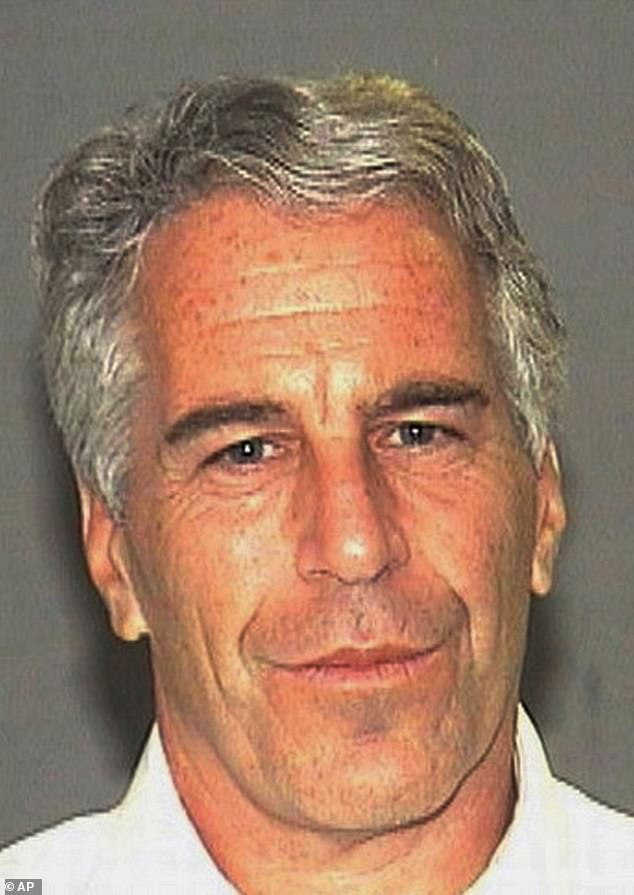
Epstein’s mug shot from July 27, 2006, when he was arrested by Palm Beach sheriffs in Florida
In March 2014, an anti-human trafficking organization wrote to Harvard’s president to complain that it was ‘unusual and disheartening . . . to read almost daily press releases distributed by a pedophile [who] feels entitled to identify himself as a ‘Harvard philanthropist.’
The PED facility, however, was not ordered closed by the university until 2021 following Epstein’s final arrest in July 2019. Nowak was placed on leave, with full pay, in 2021, but by May 2023 had resumed teaching, and remains at the university.
Perhaps most revealing of all, Harvard University kept the vast majority of Epstein’s donated cash.
Lawrence Bacow, Harvard president from 2018-23, said at the time that only $200,937 of the $9.1 million would be returned, because that was all that ‘remained unspent’.
Approached for comment, neither Harvard not Larry Summers responded.

